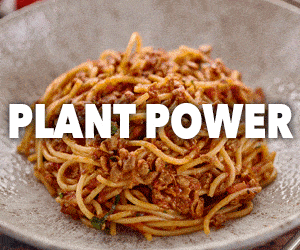After one of the worst years for climate on record, data from Ecosia has revealed how people across Britain are eating less meat or embracing plant-based diets because of climate-related reasons.
Global food systems are responsible for more than a third of greenhouse gas emissions – contributing to deforestation, biodiversity loss and polluting waterways. As a result, more people are taking actions into their own hands to limit future climate disasters. With more than 600,000 people expected to take part in Veganuary this year, people are starting to permanently change their diet to combat the climate crisis, with a further 32% of respondents willing to make changes.
Climate activism on your plate
The Censuswide survey of 2,000 people, commissioned by Ecosia, found that in the wake of recent extreme weather events, one in 10 people nationally now consider themselves to be climate activists. Changing their diet, or considering doing so, is one of the many ways people are taking the fight against the climate crisis into their own hands.
Overall, over one in 10 people are reducing the amount of meat they are consuming, with a further 10% of people now pursuing a pescetarian, vegetarian or vegan diet. More women than men are reducing meat from their diets or considering themselves vegan, whilst men are more likely to have a pescetarian diet.
Climate-related diets span the generations
Of the age groups surveyed, those aged 25-34-years-old were more likely to say they had changed their diet for climate-related reasons (29%), with this age group having the highest percentage of vegans (6%). People aged 45-54 had the most respondents saying they had reduced their meat consumption because of climate change (13%), compared to other age groups. Those aged 55 and above were the least likely to change their diet because of the climate (15%).
Generation Z (aged 16-24) were more likely than any other age group to say they were willing to change their diet, with 46% saying they were willing to have a flexitarian, vegetarian or vegan diet to help combat climate change.
Newcastle named as the most flexitarian city
Newcastle is home to the highest proportion of people who have already reduced or eliminated meat from their diets (26%), ahead of Manchester (25%) and London (24%). Nearly 30% of people living in Greater London said they had changed their diet because of climate-related reasons, ahead of the North East (27%) and the North West (23%).
Despite only 10% of people in Belfast saying they had already changed their diet because of the climate, nearly two-thirds of respondents in the city (63%) said they were willing to become a flexitarian, the highest percentage of any city in the UK.
Brits call on their governments to do more:
Despite these positive individual efforts, however, only 36% of people think it’s the responsibility of everyday people to solve the problem. Just under one-third of people believe the UK and devolved governments are ultimately responsible for solving the climate crisis and only 5% think it is doing so very sufficiently in the wake of COP26. People in Edinburgh are most likely to put the responsibility on the government – at 59% – which is the highest percentage of any city surveyed across the UK. Nearly 30% would then like the government to prioritise climate change over the economy (29% versus 41%).
Of those surveyed, 18% believe that banning fossil fuels is the most effective way to tackle the climate crisis, followed by carbon reduction technology (16%) and planting more trees (14%).
When it comes to climate activism, 45% want action taken against the most polluting fossil fuel companies, with research suggesting that just 100 companies (including the likes of Shell, BP, ExxonMobil) are responsible for 71% of all carbon emissions. Actions popular with Brits include a total ban on fossil fuel pollution, instead of weakening commitments to reduce them, and a drastic increase in tree planting.
Optimism across all age groups:
Overall, people are hopeful that we will be successful in fighting the worst impacts of the climate crisis, with 67% saying they were positive or somewhat positive. This optimism was evenly spread across all age groups with 16-24-year-olds and 35-44-year-olds the most optimistic (70% and 69% respectively) compared to 55+-year-olds (66%).
Sophie Dembinski, UK Country Manager at Ecosia, commented: “The detrimental effects of the food system on the world are well publicised – contributing more than a third of greenhouse gas emissions, with meat accounting for at least 60% of this, as well as causing deforestation, biodiversity loss and polluting our water systems. It’s no wonder that such a growing number of people are changing their diet because of the impacts of the food we eat on the environment and the climate. Whilst becoming a vegetarian or vegan won’t solve the climate crisis alone, reducing or eliminating meat from your diet can help contribute to a more sustainable food system and send a message to governments and food producers that there need to be systematic changes to the way we produce food if we are to reduce carbon emissions and limit global warming.”
Ecosia is the not-for-profit search engine that uses advertising profits to plant trees across the world, enabling people to make more environmentally-conscious decisions in their daily lives. Last year, the company helped finance the climate documentary, Eating Our Way to Extinction, released in August and narrated by Kate Winslet.











